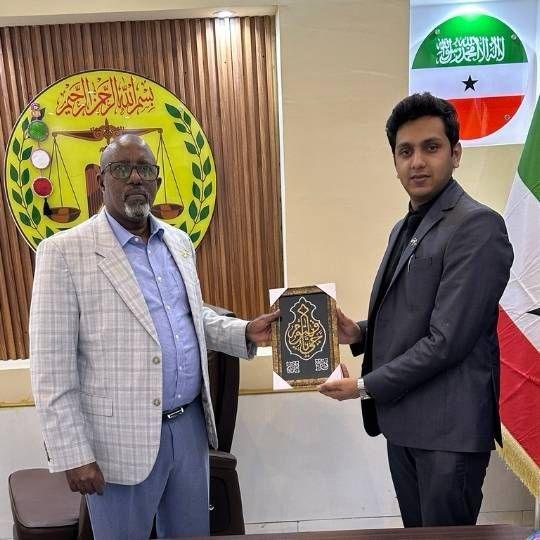By Pakiza Zainab (Pakistan)
Abstract
Laws related to marriage contracts, repudiation of marriage, and polygamy are of immense importance since the law of personal relations is regarded as the heart of Shariah. Under classical Muslim law, a husband is permitted to enter into a maximum of four marriages at a time. Polygamy is said to be a hotly contested practice which is prone to widespread misunderstanding of the Quranic provisions and subsequent misinterpretations. This paper sheds light on various misunderstandings attached with the said permission and lays down the reforms which have taken place throughout the World. Some of the reforms are prohibitive in nature while some reforms aim to spread a net of procedural checks for a Muslim husband to pass through in order for him to marry more than one woman.
Introduction
The classical position regarding polygamy is mentioned in Sura IV verse 3 which states “If ye fear that ye shall not be able to deal justly with the orphans, marry women of your choice, two or three or four; but if ye fear that ye shall not be able to deal justly (with them), then only one, or (a captive) that your right hands possess, that will be more suitable, to prevent you from doing injustice”. It is often observed that Islam permits husbands to contract polygamous marriageswithout any conditions or explanation to be provided by the husband. However, it is only because the Quranic provisions have been misconstrued or conveniently interpreted by the jurists/ulema and the conditions imposed by the Quran have largely been ignored.
Historical Background
Before the emergence of Islam, practice of unrestricted polygamy was common in Arabian tribes and Arab men were free to marry as many women as they wished. In a nutshell, pre Islamic era treated women nothing more than an object. The Holy Quran restricted the practice of unlimited polygamy by allowing to marry only four wives at a time. There are many misconstructions and misleads attached to the ayat of Quran which permits polygamy.
Is the Permission to Contract Polygamous MarriageLimited, or is it an Outright Permission?
It is argued that polygamy was not initiated by Islam, rather Islam curbed the unlimited practice of polgamy for the sake of social necessity of that time. Many modernist scholars especially women such as Amina Wadud, Asma Barlas, and Shaheen Sardar Ali, claim that polygamy was a cultural concession extended to men considering the societal structure and circumstances at the time of the Prophet Muḥammad (pbuh). This argument is supported from the historical context in which polygamy was permitted. There was a prevalent practice in Arab that a man could marry as many wives as he wanted, the Quranic verse 4:3 restricted the practice to maximum four wives at a time along with a condition which indicates that Islam has always tried to curb the practice of polygamy. The prevalent and unnecessary practice of polygamy, be it either in muslim majority or muslim non-majority countries, is due to the problematic interpretation of the ayat itself which permits polygamy, this is to suggest, that the permission, to contract a polygamous marriage, itself is limited.
Shaikh Mohammed Abduh, has emphasised upon the highly rigorous criteria of polygamy by mentioning an example of the law of inheritance in Muslim law. According to Muslim law, if a man with two or more than two wives dies, all his wives together will inherit only the portion of a single wife. This clearly implies that Islam does not aim to generously allow a husband to marry more than once. If Islam had out rightly permitted polygamy the way it is being practiced conveniently today, it would have given to the four wives a greater portion than that for a single wife or had created separate conditions for polygamous unions.
Sheer Ignorance of Verse 129 of Surah IV
Not much surprisingly, there is a great ignorance of verse 129 of that very same Surah IV which permits polygamy. Verse 129 states that “ye shall not be able to deal in fairness and justice between two women however much ye wish”. This verse is a prime example of how Quranic verses have been misconstrued. The implication that Quran itself laid out the impossibility of maintaining justice and equality towards more than one wife, indicates the highly restrictive and extremely stringent nature of permission to contract polygamous union. An Egyptian reformer, Shaikh Mohammed Abduh further stated that the permission is only an exceptional measure resorted in times of extreme necessity, that it is permissible only to those who need it and are sure to observe justice. By mentioning that impartiality and justice are ideals that are humanly impossible to be maintained, the Quran has affirmed that by no means, it favours or encourages polygamy rather the Divine law contemplated monogamy as the ideal state of marriage.
How is Equality Supposed to Be Measured?
With regards to equality, there is controversy as to what actually entails ‘equality’. Doi states that equality is meant to be understood in terms of food, residence, clothing and sexual relations however, it has been counter-argued that equality is mentioned in context of financial support and maintenance only. Under classical muslim law, it is the task of the husband to uphold equality amongst his wives. Hinchcliffe claims that “equitable treatment is construed as a matter for man’s own conscience not as a condition precedent for a polygamous marriage”. This is partly the reason why there is a prevalent practice of muslim husbands getting a free licence to marry more than once and not be scrutinised for their actions by any court or ruler.
Polygamy: A Measure of Resort as a Lesser Evil?
Polygamy cannot be said to have entered into the fold of Islam with an intention of a general rule rather it was made inevitable as a lesser evil to counter the issues of widows and orphans when Islam was in its nascent stage. Wars resulted in great number of casualties and there was a fear of orphans and widows being mistreated and exploited. This is evident in verse 3 of Surah IV which states, “If you fear that you might not treat the orphans justly, then marry the women that seem good to you: two or three, or four. If you fear that you will not be able to treat them justly, then marry (only) one, or marry from among those whom your right hands possess”. In the previous times, when a widow was left with orphans to bring up, neither was she suppose to get any share of inheritance nor were people inclined to marry widows who had children due to the burden of bringing up another person’s children. Islam laid down two reforms to relieve the distress caused to widows and orphans. The widow and orphans were given their share of inheritance and limited polygamy was allowed to provide a reliable shelter for the them.
The motivation to permit polygamy was to secure social justice because the widows used to get exploited at the hands of people in the society who used to loot them and try to make an advantage out of their vulnerable state. Allah sent the Ayat in order to alleviate the suffering of widows and orphans in this way, given that if this permission led to injustice in family relations then the individual was advised to practice monogamy. A huge misconception attached to the practice of polygamy is the Prophet (pbuh)’s example of having multiple number of wives and is usually quoted to exploit the spirit of Islam with regards to polygamy. However, Prophet (pbuh) married other wives only after his first wife died and most of his wives were widows or divorcees. If these women would not have been married to Prophet (pbuh) they would have been destitute or given in exchange of personal or tribal bonds given the fact that women were considered no less than an object in those times. Therefore, polygamy seems to be not more than a concession to necessary social conditions which was given with greatest reluctance.
Fear of Injustice Among Wives?
It is undisputed that polygamy is only permissible where thereis an absence of fear of injustice. This can be supported from an authentic tradition reported in times of Prophet (pbuh). It is reported that the family of Hisham ibn Al-Mugirah have requested Prophet’s (pbuh) permission to give their daughterin marriage to Ali Ibn Abi Talib. Prophet (pbuh) is said to have reported, “I did not give them my permission for this, nor will I give it to them in future, unless and until Ali Ibn Abi Talib divorces my daughter, for surely she is part of me and what troubles and agitates her troubles and agitates me too; and what harm befalls her befalls upon me too”. This tradition thoroughly explains that polygamy was out rightly discouraged where there was a fear of injustice amongst the polygamous wives of a man. The fact that the Quran explicitly discourages polygamy in Verse 129 of Surah IV and that there are precedents, mentioned above, where polygamy has been denied on the grounds of fear of injustice, has led to many major reforms in the Muslim world.
Reforms in the Muslim World
Laws are like metals in the crucible of time and circumstance; they melt, they solidify into different shapes, they re-melt and assume diverse forms. This process of evolution is co-terminous with human society. Islamic law works in a similar way. There have been many progressive changes in Islamic law which act to modify the law to comply with changing conditions and needs of the society. The legal reforms in Muslim majority countries as well as Non-Muslim majority countries range from prohibition to regulation of varying degrees. The legal reforms in most Muslim countries shed light on the fact that there has been an evident shift from the classical position of polygamy, being an unconditionally allowed practice, towards a practice which entails some educational and somewhat restrictive procedural checks. Many Muslim countries have gone to the furthest extent and have out rightly prohibited polygamy. Contemporary legislations in many Muslim countries, including Pakistan, take the modernist approach by introducing regulation of polygamy with an object to protect the rights of women. These reformist steps include making consent of the first wife compulsory for polygamous marriage, informed consent of the prospective wife based on marital status of would-be husband, granting the first wife the right to dissolution on polygamous marriage of her husband, ascertainment by a judge about necessity of polygamous marriage along with financial position of husband and his capacity to treat wives equitably.
Pakistan
In Pakistan, polygamy remained unregulated until the legislation of the Muslim Family Laws Ordinance 1961 (MFLO). Nevertheless, the traditionalists within the Pakistani society were not ready for a complete prohibition of polygamy like Turkey and Tunisia, regulations were imposed in the form of stringent conditions under section 6 of MFLO. Subsection 2 of this section requires a man to submit an application to the Chairman of the Union Council for securing permission to enter into another marriage. In his application, he is required to “state the reasons for the proposed marriage and whether the consent of existing wife or wives had been obtained thereto“. The Chairman of the Union Council on receipt of such an application is required to call upon the petitioner and his wife to nominate their representatives, and the Arbitration Council so constituted, may grant permission with or without any conditions after satisfying itself that the proposed marriage was “necessary and just.” While assessing whether the proposed marriage is necessary and just, the Arbitration Council considers the following amongst other grounds:
Therefore, this section restricts the practice of polygamy and permits it only in cases where it appears necessary and just to the Arbitration Council.
Turkey and Tunisia
Turkey and Tunisia have brought prohibitive reforms and have completely eliminated polygamy. Moreover, in Tunisian law polygamy has been made a criminal offence. Tunisian jurists considered economic inefficiency as a reason to ban polygamy since it is completely impractical in today’s day and age to maintain at least economic equality amongst several wives.
Morocco
Similar to the tradition reported above, the Moroccan Code of Personal Status 1958 prohibited polygamy ‘when there was any apprehension of unequal treatment‘. It allows the wife to demand divorce if restriction on polygamy is stipulated in her marriage contract. The Moroccan law went further to protect women by stating that new wife must be informed about husband being already married and in accordance with classical Maliki law, the existing wife was allowed to demand divorce in case of no proper maintenance.
Syria
The Syrian Law of Personal Status 1953 further shows that financial ability of husband is considered to be of prime importance to ensure equality. The Syrian law allows the judge to refuse to permit another marriage if man cannot support two wives. These reforms are procedural in nature and provide efficient checks.
Iraq
Unlike the classical position where a man is not under scrutiny of marrying more than once, the Iraqi Law of Personal Status 1959 imposed similar restrictions as Syrian law by stating that “it is not permissible for a man to marry more than one woman without authorisation from judge who will permit if satisfied that husband is capable of financial support, some lawful benefit is found for husband, and if there is no fear of unequal treatment”. This shows that a net of conditions has been laid out through which a husband has to pass in order to be eligible for marrying more than one woman.
Jordan
The Jordanian Law of Family Rights 1951 relies on classical position in Hanbali law by providing the wife with only a remedy of stipulations in her marriage contract. It states that a stipulation in marriage contract restricting husband to one wife is valid and could be a ground for divorce by wife by way of judicial dissolution.
Conclusion
It seems that legal reforms of various nations present a good balance of classical muslim law and modern ideas which deviate more towards disapproving of polygamy. The fact that all such reforms have taken birth from the interpretation of Quranic injunctions implies that ascribing unqualified practice of polygamy to Islam would be a radical statement to be made. Therefore, absolution attribution of polygamy to Islam is a misconception that fails to consider the historical and social contexts in which it has eventually evolved. It is neither an obligatory practice nor a universally practiced aspect of Islam. Through an in-depth and correct understanding of the institution of marriage, it is clear that God has made the fair treatment of women, an uncompromised rule, which means that polygamy is nothing more than a strictly regulated practice.




